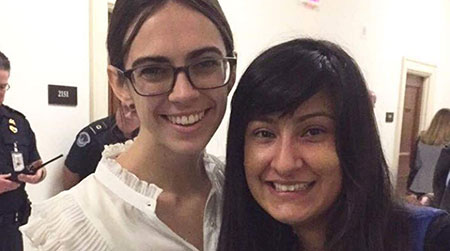While many public health programs offer engaging learning experiences, the George Washington University Milken Institute School of Public Health’s location in the nation’s capital enables students to engage in events that make history and change lives. A course requirement to attend a Congressional hearing boldly demonstrated the intersections of public health, management, policy, and environmental justice, to MPH students Brenda Trejo (Global Environmental Health) and Emma Sullivan (Environmental Health Science and Policy) when they experienced an outrage-filled hearing on the drinking water crisis in Flint, Mich.
Over the last 18 months, and despite residents’ protests about the appearance, taste and smell of the water, failures at and inaccurate reassurances from every level of government left Flint with lead-contaminated drinking water. During that time, lead poisoning rates among the area’s children are reported to have escalated from 5 to 15 percent.
The hearing, held by the House Oversight and Government Reform committee on Feb. 3, validated the need for strong public and environmental health policies and leadership at federal, state and local levels. The anger of the lawmakers was unmistakable but did not compare to what Sullivan and Trejo heard firsthand from Flint residents.
As Sullivan explains, “Being in the same room as people from Flint, many of whom had traveled hours by bus, made the experience personal and urgent. We could feel their passion and their frustration.” The GW women spoke with several people at the hearing who expressed anguish that the poisoning was intentional and an environmental racism issue. Sullivan continues, “Their concern was very real and extremely troubling. It exposed an area that I need and want to study more.” Similarly, the FlintLivesMatter shirts and signs further instilled a realization Trejo reached in her Social and Behavioral Approaches to Public Health core class: Race and class play a role in health outcomes of people and communities.
For Trejo, a Gates Millennium Scholar and an Admissions Ambassador, the hearing also brought names in the news to life. “I have witnessed the concerns of many marginalized communities being silenced or ignored and it was inspiring to see the resilience and dedication that helped bring attention to the crisis,” she says. Trejo pointed to the efforts of LeeAnne Walters, one of Flint’s “water warriors” whose relentless activism forced the city to re-evaluate its water’s safety.
Both students were dismayed that the events in Flint were allowed to occur. Sullivan explains, “In Environmental and Occupational Health in a Sustainable World, with Professors George Gray and Peter LaPuma, we learned about the many different stages of wastewater treatment that exist in the U.S. to ensure that drinking water is safe. There are a myriad of environmental issues that threaten the health of people throughout the world. Safe drinking water should not be one of them. The extent of the negligence that occurred in Flint is unacceptable.”
Getting to a hearing, required for the students’ Management & Policy Approaches to Public Health class, was easy: a quick Metro ride, five to ten minute wait to get inside the building, a security check, and navigating the halls of Congress. The event and conversations with other attendees were memorable and affirming for both students as they witnessed the real-life application of their studies in safety, policy, and advocacy. “Attending the hearing has re-fueled my passion for environmental justice. I made the right decision to come to GW where I can gain the tools to become a competent environmental health advocate.” Trejo says.
Sullivan left the hearing with a similar conclusion. She adds, “The hearing made me grateful that I am studying Public Health at GW; no other city but our nation's capital could provide the type of experience that has enhanced my studies and inspired my future career.”
Attending the Congressional hearing on the Flint water crisis involved far more than watching it on C-SPAN. Sullivan and Trejo brought their knowledge, compassion, and desire to learn to a dynamic and contentious event. Their experience exemplifies how the Milken Institute School of Public Health works to inform thinking, build skills and link students to the real-world events that tie it all together.
Assistant Professor Kate Applebaum, Program Director for the MPH in Environmental Health Science and Policy, observes, “The ability to access notable events is another vibrant dimension of Milken Institute SPH. When students avail themselves to the school’s and the city’s many offerings, learning deepens and understanding, opportunities, and capabilities for service grow.”


